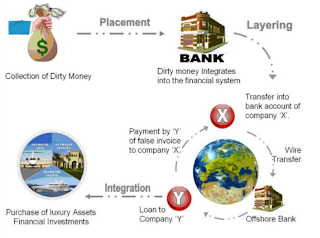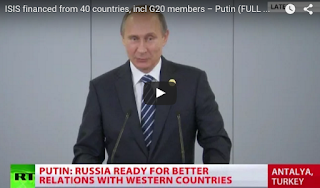
Call me idealistic, but I choose to believe that we can defeat terrorism as long as we work together.
The problem is, we aren’t.
In the aftermath of the barbaric Paris attacks last Friday, November 13th, everyone now seems to be wary of ISIS. Whereas Al-Qaeda successfully got the world’s attention with their bombing of the World Trade Centre in 9/11, ISIS has solidified their brand as the most-feared and barbaric terrorist group the world has seen to date.
Some believe Iran should be blamed for the rise of ISIS, others claim the U.S. and its allies are the ones responsible, while Russia’s President Vladimir Putin asserts he has Russian intelligence data showing that the terrorists appear to be financed from 40 countries, including some G20 member states.
But since the fault has already been committed, there is little use in pointing fingers now.
ISIS is a highly complex and intelligent terrorist organization
In the early days before the cold-blooded execution of American journalist James Foley, many Western governments refused to intervene, believing that ISIS was nothing more than a local threat. Now that ISIS has ventured beyond the Middle East and carried out large-scale attacks on Western countries, the world finally acknowledges how dangerous the group is, but are we too late?
We should take heed that ISIS has already gained control of most of eastern Syria and north-western Iraq, with groups from as far away as Somalia, Pakistan and Malaysia pledging allegiance as well. ISIS’ territorial control has included Iraq’s largest city of Mosul and the northern suburbs of Baghdad since last year.
They have also secured military stockpiles in Syria and Iraq, including advanced surface-to-air missiles that are among the latest Russian and U.S. models. Whilst most traditional rebel groups grapple with a lack of sophisticated and updated weaponry, ISIS does not seem to have this problem at all.
 |
| The Newsweek has a great article here about how ISIS funds its regime of terror. Worth a read. |
Their finances are also comparable to that of an extremely wealthy state, including a proportion of almost $200 million in under-accounted charitable aid to Syria last year, selling of crude oil supplies on the black market raking in $1 to $3 million a day, taxes, religious tithes, billions in cash looted from Syrian and Iraqi banks, lucrative border crossings with a whole list of countries – Turkey, Syria, Kurdistan, Jordan and Saudi Arabia – and more.
Many of the ISIS-trained fighters can return to their home countries to execute lone wolf attacks, recruit more extremists and extend ISIS’ reach even further across the world. As it is, ISIS has already successfully smuggled thousands of covert jihadists into Europe, and have numerous other recruits in other countries around the globe working for their cause. Singapore nearly became victim to youths who were plotting attacks (but thankfully caught before their plans materialized). Experts have warned that ISIS’ next step could be to start recruiting the Muslim Rohingya people who are persecuted in Burma and refused asylum by neighbouring Asian nations.
The Solution?
Closer to home, a former Nominated Member of Parliament in Singapore believes the ultimate (and”simple”) solution lies in killing ISIS and their children.
NO. That is wrong on so many levels, and plainly misguided. What kind of person will think of killing innocent children? How does that make us any different from those in ISIS who do not spare a second thought before they behead, shoot, or bomb people they barely even know? It befuddles me how a former NMP can actually be capable of such bloodcurdling comments.
Let’s get this right: the solution to terrorism is not hate. What we need is more cooperation and greater understanding. If terrorist groups can work together across borders to execute attacks, why can’t our (stronger and better equipped) governments do the same?
The answer is simple: the world simply isn’t committed enough to fighting terrorism. It has been 14 years since the 9/11 attacks shook the entire planet, but we have not grown any wiser, nor any more united, in our fight against terrorism. 
Some claim terrorist groups like Al-Qaeda and ISIS are stronger and smarter than our governments. I do not believe that for a moment. But what they do have (which the rest of the world doesn’t) is their unity of strength to work together for a common cause.
Many believe the root of the problem stems from how the geographical divisions were carved out in the Middle East, resulting in the tense situation of the Sunnis becoming a minority in the countries they were forcefully divided into, and therefore argue that the solution to ISIS would be to give the Sunnis back their lands and a state to govern.
My solution is even more simplistic, but calls for a lot more resources – everyone needs to get involved.
On the international arena, governments need to put aside their differences and work together to fight ISIS. The tools that make ISIS so powerful are the same tools we own – the only exception is that we are hesitant about combining forces when these extremists are not. Share intelligence (yes, even with Russia!), combine military resources, and put aside all your differences to fight together against a common enemy.
In their home countries, governments and regulatory authorities need to also impose stricter measures to cut off terrorism funding and implement effective sanctions controls. While many countries have joined in by strengthening AML/KYC controls on financial institutions, we need to also look at other sources of funds. Take a moment to ponder how ISIS gets the money it does from selling all that oil to fund their terrorist missions – who buys that oil? Governments? Businesses? Multinational organizations? Whoever it is, we need to clamp down on them so we can cut off a major source of ISIS’ finances.
 |
| A simplistic view of how money in the global banking system can be cleverly channeled to funding terrorism causes. |
Businesses must become more ethical and compliant. The problem is, many of the multinational companies I’ve met in my work are still reluctant to implement proper compliance and monitoring tools to fight against indirect terrorism financing. In a world where profits matter most, I’m struck by the sad realization that this may never fully happen on a scale massive enough to combat terrorism.
Charitable organizations need to also be scrutinised, and not enough work is being done on this front. Money is also routinely laundered in the form of fake humanitarian aid to reach ISIS, a problem we cannot afford to ignore. ISIS has also been funded by governments and a large network of private donors – including Persian Gulf royalty, businessmen and wealthy families – giving them the financial resources to carry out their acts.
Individuals can also play a part. I read this heartbreaking article about the mothers of sons who joined ISIS, many who have unwittingly become fluent experts in the language of jihad and identifying the unmistakable signs of radicalization. Unfortunately, many of these (small) groups continue to receive little support from governments in order to continue the work that they do. Imagine all the early converts that could be identified before we lose them to ISIS or other terrorist factions. Or remember how friends of the Singaporean youth (caught for his links to ISIS) actually knew about his conversion, but did not tell the authorities? As citizens, we need to be more vigilant, and do our part in reporting suspects to the local authorities. Instead of leaving it to the police and governments, we need to also be the country’s “eyes on the ground”.
If you think simply putting the Paris filter over your Facebook display photo is enough to show your support, I urge you to do a little more for our collective humanity. It is time we put a stop to all of this violence and merciless killings. Instead of merely leaving ISIS to governments to solve, or calling for Muslims to “own” the problem, we need to acknowledge that terrorism is everyone’s problem to solve.
 |
| Credits: Pakistan Herald |
How many more people will die before we start to really commit to combating ISIS and the larger problem of religious terrorism?
What more will it take before the world decides to work together?








1 comment
Won't work as the players have divergent objectives http://www.nytimes.com/2015/11/17/opinion/the-attacks-in-paris-reveal-the-strategic-limits-of-isis.html
Comments are closed.